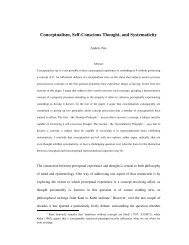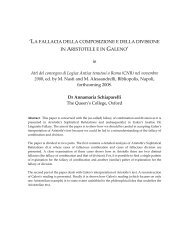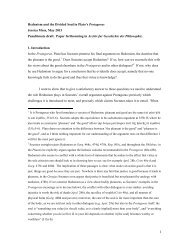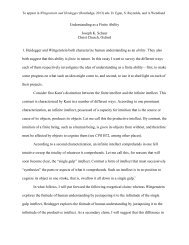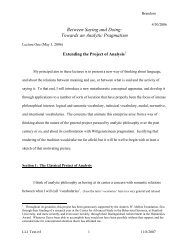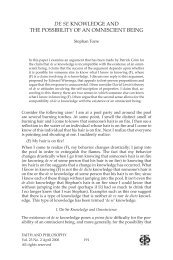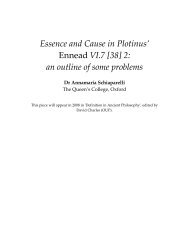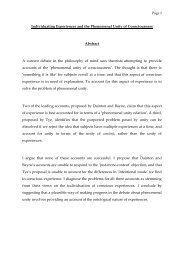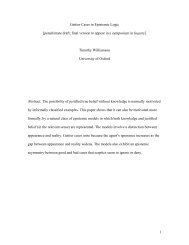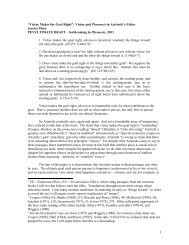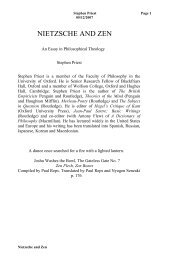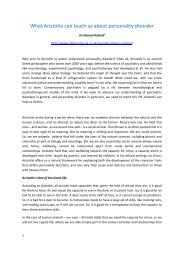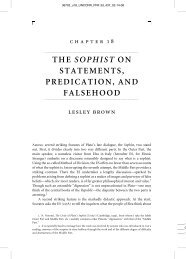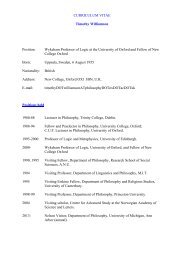The Geography of Genethics and the Ends of Life1 - University of ...
The Geography of Genethics and the Ends of Life1 - University of ...
The Geography of Genethics and the Ends of Life1 - University of ...
Create successful ePaper yourself
Turn your PDF publications into a flip-book with our unique Google optimized e-Paper software.
a higher level <strong>of</strong> well-being than <strong>the</strong> o<strong>the</strong>r, many have <strong>the</strong> intuition that <strong>the</strong> potential<br />
procreator ought to create A ra<strong>the</strong>r than B (Parfit 1984; see Belshaw 2003 for a contrary<br />
view). Perhaps we confuse <strong>the</strong> thought that B has a marginal life—that is, a life not worth<br />
starting—with <strong>the</strong> thought that S should have created A ra<strong>the</strong>r than B. But <strong>the</strong>se are two<br />
quite different thoughts, <strong>and</strong> <strong>the</strong> latter does not entail <strong>the</strong> former. Of course, this point<br />
does not provide a full explanation <strong>of</strong> <strong>the</strong> marginal life intuition, for <strong>the</strong> intuition seems to<br />
retain some force where <strong>the</strong> decision facing a procreator is between having a certain child<br />
<strong>and</strong> having no child.<br />
Ano<strong>the</strong>r intuition with which <strong>the</strong> marginal life intuition might be confused is that<br />
someone might be unfortunate to have been born with a certain condition. <strong>The</strong> parity<br />
<strong>the</strong>orist denies that Amy has been wronged by having been brought into existence, but he<br />
need not deny that she is unfortunate to have been born without a limb. It seems to me<br />
that we regard those born without a limb as unfortunate to have been born without a<br />
limb, <strong>and</strong> not—as Benatar suggests—as unfortunate to have been born at all.<br />
A third response is <strong>the</strong> most important: third-person marginal-life judgments are not<br />
reflected by first-person marginal-life judgments. Consider <strong>the</strong> very example that Benatar<br />
uses: it is better not to bring into existence somebody who will lack a limb. Whatever<br />
intuitive support this claim might have, <strong>the</strong>re is no doubt that it has less intuitive support<br />
than <strong>the</strong> claim that someone who was born without a limb should regret having been<br />
born. (Indeed, I suspect that most <strong>of</strong> us think that, ceteris paribus, it is not reasonable for<br />
those born without limbs to regret having been born.) Perhaps those born without limbs<br />
<strong>of</strong>ten regret having been born without limbs, but I doubt that <strong>the</strong>y tend to regret having<br />
been born. (And if <strong>the</strong>y regret having been born, it’s not on account <strong>of</strong> <strong>the</strong> fact that <strong>the</strong>y<br />
were born without a limb.) Faced with a choice between having been born without a limb<br />
<strong>and</strong> not having been born at all, such individuals would generally choose to have been<br />
born without a limb.<br />
But if cases that generate third-person marginal-life intuitions do not generate first-person<br />
marginal-life intuitions, <strong>the</strong>n we are faced with a difficulty. I argued earlier that firstperson<br />
<strong>and</strong> third-person genethical judgments should be brought into alignment:<br />
judgments as to whe<strong>the</strong>r or not it is reasonable for a person to regret having been born<br />
should be tied to judgments concerning whe<strong>the</strong>r or not <strong>the</strong>y have been harmed by being<br />
born. <strong>The</strong> fact that we don’t have first-person marginal-life intuitions in <strong>the</strong> missing limb<br />
case—<strong>and</strong> indeed think that such intuitions would be unreasonable—suggests that <strong>the</strong>re<br />
would be something problematic about third-person marginal-life intuitions in such cases.<br />
12



